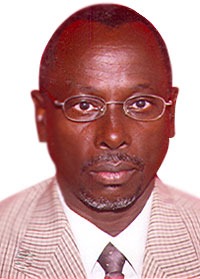This is a season of traitors and betrayal. Rwandans still remember this time twenty years ago when the world abandoned them to calculating genocidaires and deranged mass murderers. The result was more than a million people killed. It was an unconscionable betrayal by the world’s most powerful nations, the United Nations and that custodian of the collective conscience – the church.


This is a season of traitors and betrayal.
Rwandans still remember this time twenty years ago when the world abandoned them to calculating genocidaires and deranged mass murderers. The result was more than a million people killed. It was an unconscionable betrayal by the world’s most powerful nations, the United Nations and that custodian of the collective conscience – the church.
On Sunday Christians celebrated Easter – the resurrection of Christ three days after he had been killed at the instigation of the religious leaders of the day. They had got one of his disciples to betray his master. Christians ought to be grateful to Judas Iscariot for the death of Christ, for without it there is no resurrection and there is no Christianity.
But they cannot. Instead they condemn him for committing the most heinous crime – betrayal of an innocent man and the son of God, too. Never mind that Judas was only a tool in the fulfilment of an ancient prophesy and that he was subsequently so overcome by remorse that he hanged himself.
Today we continue to hear reports of treachery in our midst. A number of local government officials in Musanze District in Northern Rwanda have been arrested for betraying their electorate and nation, and collaborating with the genocidal, terrorist and misnamed Democratic Forces for the Liberation of Rwanda (FDLR). A celebrated musician and Genocide survivor was arrested for a similar offence. Arrested with him was a radio journalist well-known for his broadcast of folktales to children.
The arrest of the musician on treason charges has excited debate about traitors and betrayal – including disbelief about some people not being capable of treachery. The question then is: who can be a traitor? A scoundrel? Certainly not, for that is to be expected. A hypocrite? None would be such if they were not duplicitous.
A traitor therefore can only be a person with a sense of what is good or bad who knowingly goes against it. For most ordinary folk, treachery is a moral and social offence because it is betrayal of commonly held values such as trust, commitment or pact. The betrayal may be of an individual or a collective like a nation. That is why it excites such strong feelings. Anyone, except a rogue or charlatan, is capable of treachery. It should not come as a surprise that a musician of moving or sacred songs, or anyone else, should be held for committing the offence.
Why should anyone, armed with any moral sense make the wrong call or deliberately go against the values that define our humanity?
One of the most obvious reasons is greed – the willingness to throw overboard common decency in exchange for money or other material possessions, position or power. Judas did it. Others did so before and have done it since, and no doubt will continue in future.
However, greed feeds on other human characteristics, such as vanity. Now, we are all vain to varying degrees. We believe in our own abilities. But this is usually tempered by the knowledge that these abilities are necessarily limited and that other people may have superior ones, and therefore we should not brag. The realisation of our limitations is called modesty.
But there are those individuals who believe in their singular or exceptional abilities that surpass what any other person may possess. And because of this, they think they occupy a special position that everyone should recognise. This unchecked faith in one’s unique attributes is called vanity.
Now, unexpected achievement or early celebrity status can go to the head and turn the allure of greatness into an obsession. And so when one is told how great they are and how much greater they can become, they are likely to forget about trust and commitment.
Another is piety – real or put on sense of religious reverence. There are, of course, genuinely pious people, otherwise we wouldn’t have saints. Real piety is an internal, spiritual quality, not part of external appearance. One with a saintly look is not necessarily a saint.
Piety, however, can be affected. We have had many examples in this country of rosary-reciting, Bible-thumbing and sacred music-composing individuals who saw no wrong in killing hundreds of fellow believers and then immediately returned to doing those seemingly pious things.
There are other examples where piety is a cover for naked ambition or personal inadequacy. Put bluntly, affected piety is simply hypocrisy.
When false piety and vanity meet to feed greed, as our celebrated musician has confessed, you have all the ingredients for treachery.
Most of the time people are not fooled by appearances and affectations of one kind or another. Ordinarily, we are immunised against this by a good dose of scepticism. But occasionally the immunity is weak and people get taken in by clever acting or their own wishful thinking about the intentions of other people.
This may have happened in the present cases of treachery.
This is not to condemn the accused. They will have their time in court and the lawyers will argue their case in the most learned manner – as they don’t tire reminding us and each other – and establish whether they are guilty or innocent.
Twitter: @jrwagatare


